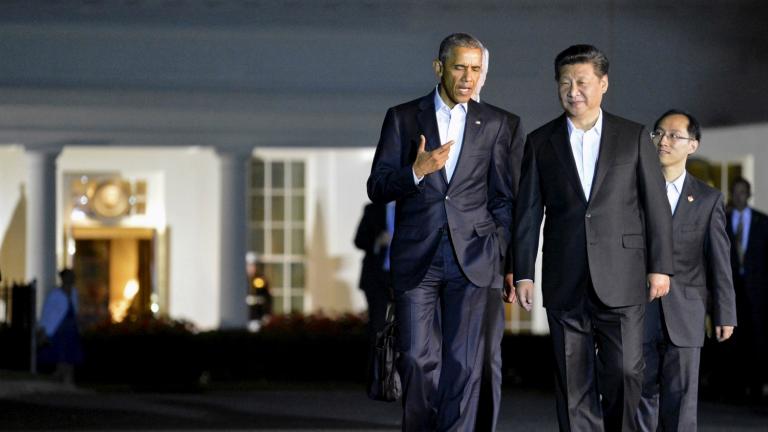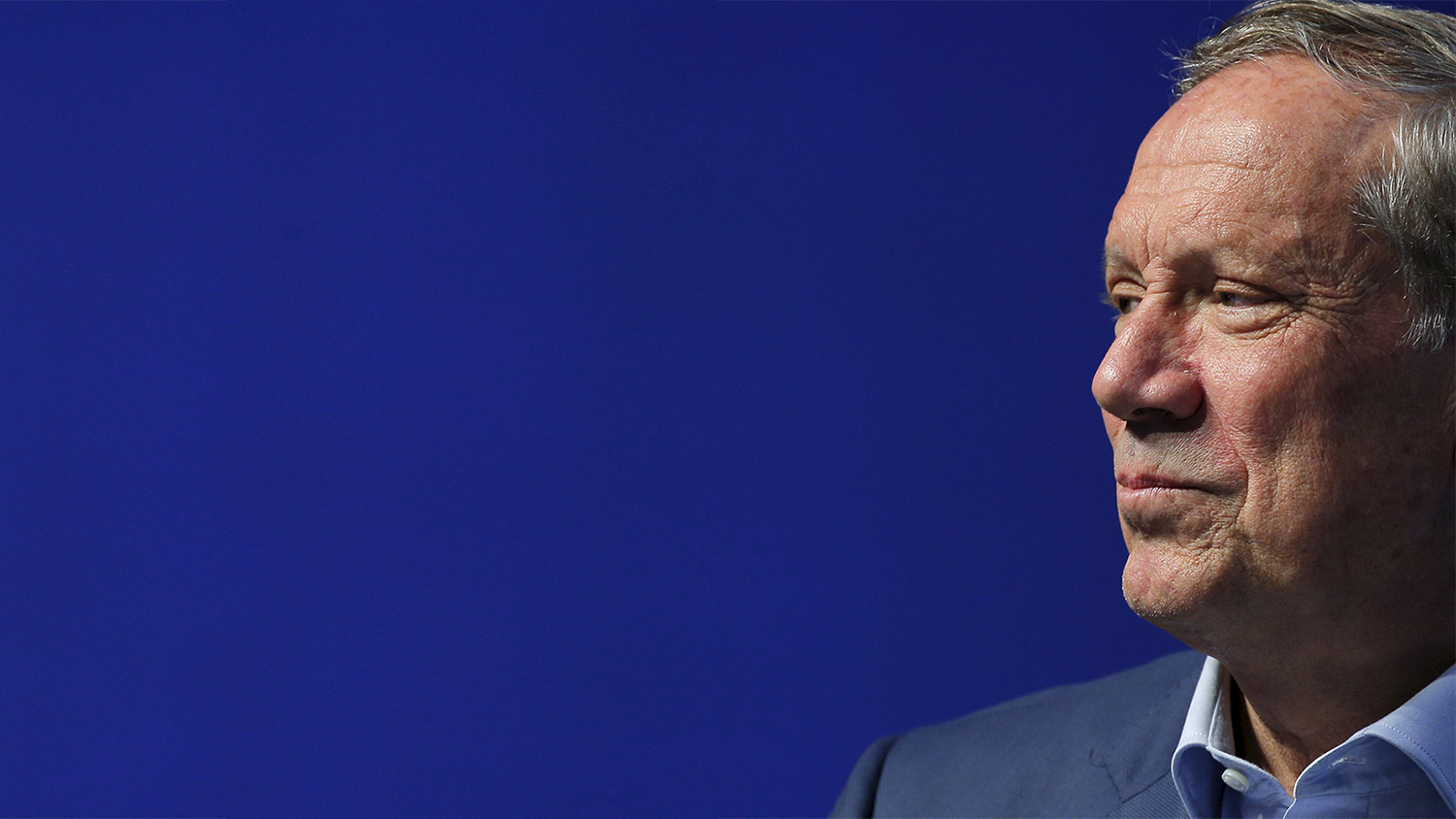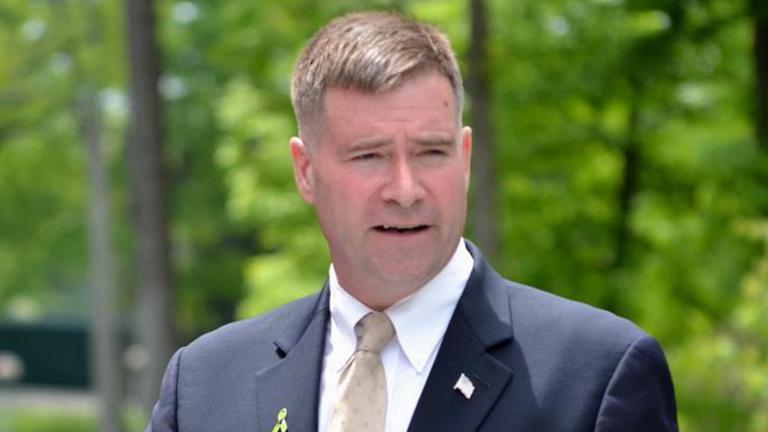You wouldn’t know it from the debates, or from the candidates’ websites, or from any public comments made by the 2016 Republican presidential contenders in recent months. But there is one guy among them who believes that climate change is human-caused and deserves immediate action.
“I’d love to shout it from the rooftop! And I hope to do that. I wish I’d been asked the [climate] question at the debate.”
That’s George Pataki, former governor of New York, who spoke to us recently from the campaign trail. True, Pataki has little chance of making it to the Oval Office. But, relative to his candidate peers, he does have a notably strong record on climate change — and at a time when the leading GOP candidate declares himself “not a believer in global warming” and trashes climate science as “bullsh*t,” that makes Pataki stand out from the crowd.
He has publicly supported national reductions in greenhouse gases since 1998. As governor, he implemented a renewable energy standard requiring state utilities to get a quarter of their electricity from clean sources. And soon after he left office in 2006, the Council on Foreign Relations named Pataki co-chair of a climate change task force that put out a report calling for, among other bold measures, a cap-and-trade program. In 2007, Pataki founded the Pataki-Cahill Group, a firm that consults for businesses building energy and environmental projects — among them, a nontoxic, low-energy way to treat wastewater for reuse, and an underwater and underground direct power line that will deliver hydroelectric and wind energy from Quebec to New York City.
Pataki clearly has a personal stake in the cleantech economy. But his views about climate solutions have shifted over time, from supporting mandatory emissions cuts to favoring “innovation” instead of regulation. We called him up to find out where he stands on these issues right now.
——
Q. Can you state your current position on climate change? Do you believe it’s a serious threat that needs immediate action?
A. Now, I know among conservatives it’s controversial, and I can understand that, because it’s become a religion on the left. Whenever something becomes a religion in the name of science, people become skeptical. But two things are non-questionable: One is that human activity is emitting CO2 into the atmosphere, and the second is that CO2 is a greenhouse gas that warms the Earth. So yes, I think that global warming is real.
Q. What immediate action needs to be taken?
A. The Obama administration approach is totally wrong. They are using the classic policies of government liberals, which is to force businesses to pay more, force consumers to pay more, raise the cost of energy, and drive jobs out of the country. In the process they have a negative impact on the environment because if a plant or factory moves from the U.S. to Mexico or India or China, they don’t have the pollution-control measures. What we need to do in America is create the technologies that will allow us to actually move toward decarbonization while growing the economy.
Q. You were part of a task force that called for a cap-and-trade program. Do you still support this idea?
A. No. No. I was appalled by what happened in Congress when the Markey-Waxman bill came along [in 2009]. It became classic Washington where it was about more government power, raising revenue for Washington, rewarding the connected and the powerful with offsets and credits. It showed that you cannot have a massive regulatory regime, or we will see costs going up, the government picking winners and losers, the cronies who have the political clout having economic benefit while others are hurt.
Q. Do you support a price on carbon in any form? Arguably nothing would drive us more quickly toward decarbonization.
A. No, I don’t. I don’t think it’s necessary to drive up prices. I support innovation. Our greenhouse gas or CO2 emissions [in the U.S.] are lower today than they were in 1995. That is an extraordinary accomplishment. And it’s not because of government regulation, it’s because of American innovation through fracking, where we’ve been able to replace so many coal plants with natural gas plants. We should also be looking at next-generation nukes. We should be looking at our infrastructure, our electric grid. We have enormous solar and wind resources. We should be looking at innovative ways that the federal government can assist with expediting the permitting process so that we can have more remote renewable resources accessible to places where the demand actually is.
Q. Scientists say we need to make fast and drastic emissions cuts to keep warming below 2 degrees Celsius and stave off the worst climate impacts. Your plan sounds like a gradual one that won’t make a difference that’s big enough or fast enough.
A. America is not the problem, America is the solution. Today, we emit only 16 percent of the world’s greenhouse gas emissions. If we were to reduce that by a few percentage points, the growth in the economy in other parts of the world would still result in a massive increase in greenhouse gas emissions. When America innovates, we can export those technologies to countries like China that are emitting almost certainly far more greenhouse gases. There are a lot of things that can be done to encourage American innovation, American technology, to dramatically lower CO2 and greenhouse gas emissions without the need to raise costs on the American people.
Q. You’ve been quiet on the climate issue since you announced your candidacy, and there’s no mention of it on your campaign website. Why is that? Do you feel that you need to downplay your devotion to this issue?
A. No, not at all. What I just said, I’d love to shout it from the rooftop! And I hope to do that.
Q. But isn’t the reality that the climate issue just won’t play well to the base?
A. No. It’s a question of [offering a] solution. Right now, no one other than me has articulated a solution other than more government power, more government regulation, more government-imposed costs, and a slower-growing economy and a loss of jobs. If you lay out this alternative choice, Republicans, Democrats, Americans would embrace it.
Q. Why is there so much infighting and polarization, do you think, within the Republican Party on this issue?
A. It’s not just this issue. There are candidates in our party who think someone should be able to impose their religious beliefs over the rule of the law. That’s just not right. I thought that fight had been over a couple centuries ago. We have to be a party that is forward-looking, that has confidence in people, and looks to empower people as opposed to trying to appeal to a small constituency in a primary process.
Q. Given all this absurdity, can Americans trust the Republican Party on climate change?
A. I wouldn’t say we can trust the Democratic Party or the Republican Party on climate change. An individual is going to be elected president. I think you put aside the party label when it comes to critical issues, and say, “What does this person believe in? What will they do?”
Q. Still, what will it take to mobilize and unify your party around this issue?
A. An intelligent solution always works. You never have 100 percent of the people behind you. When I was governor, I was always trying to drag people along. That’s what leadership is about — having ideas and solutions that work, and then coming to consensus behind it.
Q. In June, you tweeted that it’s “absurd” for Jeb Bush, Marco Rubio, and Rick Santorum to say that the pope has no standing to talk about climate change. What are your thoughts about the pope’s stance on climate change? Do you consider him a critical actor in the climate movement?
A. It’s important that figures beyond politics raise concerns and issues. And the pope has the authority, has the ability, to do that, speaking from a moral standpoint and a religious standpoint as opposed to a political or scientific standpoint.
Q. Do you see climate change as a moral issue? As a Catholic, do you see it as the responsibility of a Christian—
A. We are stealing from the future when we don’t take intelligent steps to leave the world a healthier, cleaner, greener place. I think this obligation is something that anyone in public office should feel.
Q. You mentioned fracking earlier as a kind of panacea, and yet, among other things, it’s very water-intensive — a problem given increasing drought — and raises concerns about groundwater contamination.
A. I think that reaction against fracking as an imperfect solution is part of what I was talking about when I referred to the Democrats’ view of climate change as a religion. Of course it’s an imperfect solution. I don’t think there ever will be a perfect solution. But when you can create tens of thousands of good jobs, when you can reduce our dependence on foreign oil, when you can replace coal plants with natural gas plants that are much, much cleaner, those in the environmental movement should be standing up and applauding.
Q. But some solutions are more perfect than others — solar, for instance, the cost of which has plunged in recent years.
A. Yeah! And that’s a great thing. And that’s exactly what should be happening. There’s a company we’ve worked with [at the Pataki-Cahill Group] that has developed its own nano-coding that increases the efficiency of solar panels from 18 to 48 percent. It’s not practical yet, it’s very expensive, it doesn’t have good reliability, but this is the type of innovation that we should be empowering, as opposed to having the government pass regulation and impose taxes and hurt our economy.
One of the important reasons I’m running for president is because I’m very optimistic about the future of this country.




